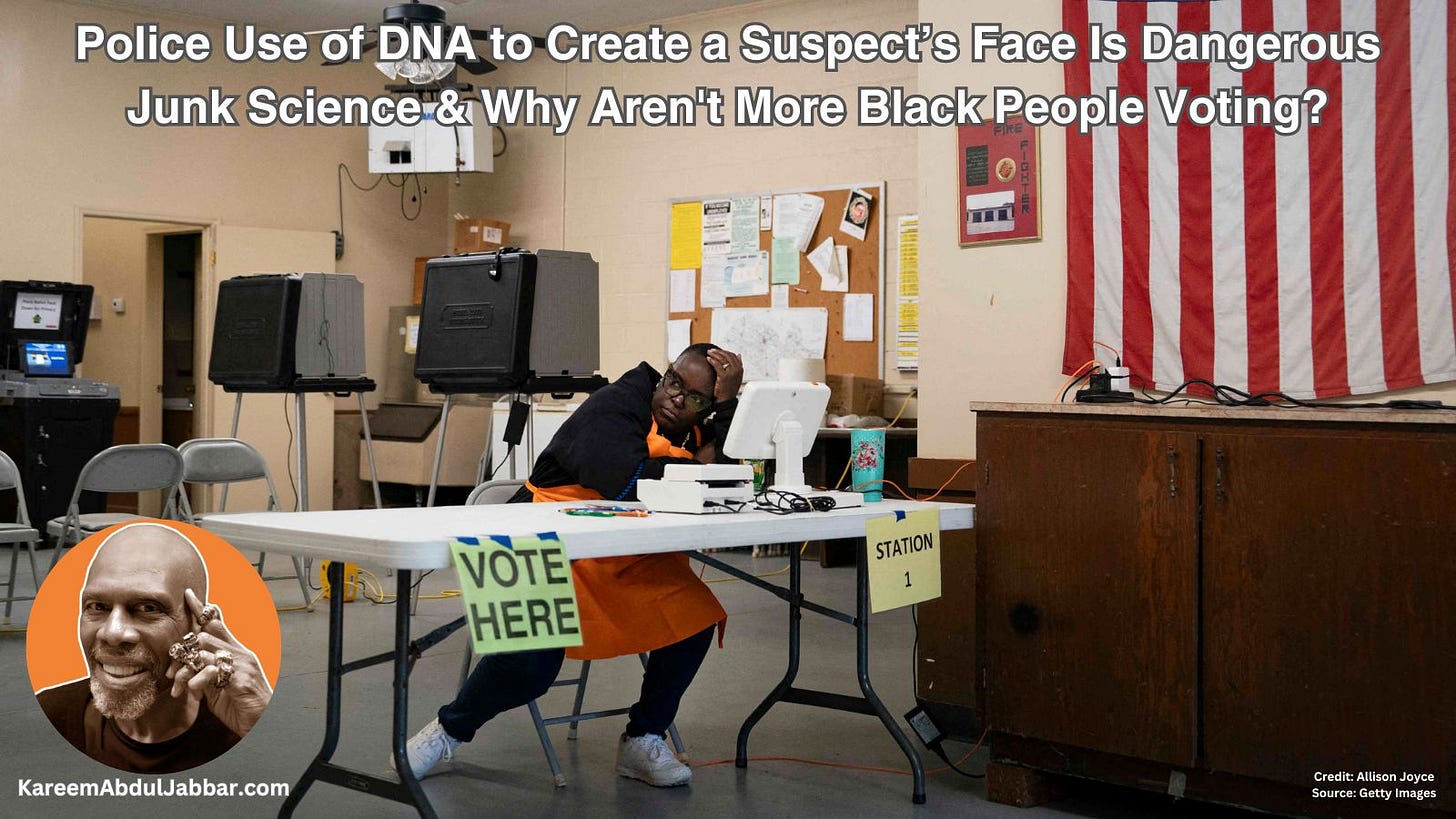Police Use of DNA to Create a Suspect’s Face Is Dangerous Junk Science & Why Aren't More Black People Voting?
Who Needs Black History Month?, Why "Do the Right Thing" Is on My List of Top Ten Movies Ever Made, Why MLK Almost Didn't Give His "I Have a Dream" Speech, Dinah Washington Sings "Unforgettable"
What I’m Discussing Today:
Kareem’s Daily Quote: The quote from Barbara Jordan comes at the end of my discussion on “Who Needs Black History Month?” It’s worth the wait.
Cops Used DNA to Predict a Suspect’s Face—and Tried to Run Facial Recognition on It: Junk science has been responsible for convicting many innocent people. Will we never learn?
People of color make up nearly a third of eligible US voters but cast only 22% of ballots, analysis says: Sixty years ago, men and women who fought to register Black voters were beaten and murdered. The current GOP attempts to restrict Black votes is an insult to their legacy and an affront to American ideals.
Kareem’s Movie Masterpiece Vault: Here’s why Do the Right Thing is on my list of Top Ten Movies Ever Made.
Kareem’s History Bites: Martin Luther King’s famous “I Have a Dream Speech” almost didn’t happen. Thanks to this internationally renowned singer, it did.
Kareem’s Video Break: The Nicholas Brothers, backed by Cab Calloway and his orchestra, put on a memorable display of tap dancing.
Dinah Washington Sings “Unforgettable”: After seven failed marriages, the Queen of Heartbreak knew what she was singing about.
Who Needs Black History Month?
February is Black History Month, and if you’re tempted to skip this paragraph that’s exactly why we need it. Oddly, the month is more controversial now than it was when it was first created in 1926 by historian Carter G. Woodson as Negro History Week. Originally, it was the second week in February because it celebrated the birthdays of Abraham Lincoln and Frederick Douglass. Woodson, the son of slaves who earned a Ph.D. from Harvard and became known as “the father of Black history,” explained why the week was so important: “If a race has no history, it has no worthwhile tradition, it becomes a negligible factor in the thought of the world, and it stands in danger of being exterminated.”
Black History Month was first suggested in 1969 by Black educators and Black United Students at Kent State University. Afterward, it became a grassroots celebration that spread across the country. By 1976, President Gerald Ford officially recognized it.
Naturally, there’s been controversy. Some in the Black community object to the month because they don’t think Black history should be confined to one month, that Black history is intertwined with American history to the extent that separating it segregates it as less important historical footnotes. This would be true if Black history were only taught for one month, but that’s not the intent nor the reality. Schools teach Black history throughout the year as part of the standard curriculum.
Black History Month is merely an opportunity to celebrate the unique and overlooked contributions of Black people that have been historically ignored or diminished. It’s a PR tool to raise awareness. This is especially important now as the country’s far-right Republicans continue their “anti-woke” campaign to erase much of Black history in schools. Florida’s Dept. of Education has gutted AP African American Studies, tweeting, “We proudly require the teaching of African American history. We do not accept woke indoctrination masquerading as education.” Remember, this is the same department that promoted history that slaves should have been grateful because “slaves developed skills which, in some instances, could be applied for their personal benefit.”
There are indications everywhere why we need Black History Month now more than ever. I get that it can cause discomfort for some. White people can feel that the need for the month is a back-handed way of accusing and scolding them for a past they had nothing to do with. A South Carolina English teacher was reprimanded last year for teaching Ta-Nehisi Coates’ brilliant and insightful Between the World and Me, a memoir that discusses racism that won the National Book Award and was nominated for a Pulitzer Prize. Two of her students reported her because the book made them feel guilty for being White. The fact that they felt entitled to report her is why we need Black History Month. The fact that she was reprimanded is why we need Black History Month. The fact that every American has reason to feel guilt about parts of our history, and embracing that guilt keeps us from making the same horrific mistakes again is why we need Black History Month.
Black History Month doesn’t confine Black history, it expands awareness so that people of all backgrounds can appreciate it for the rest of the year. What they learn during that month informs and elevates the conversations about race in all aspects of life. In the end, the lesson learned from all of Black history in America was best expressed by the first Black from the South elected to the U.S. House of Representatives in 1973, Barbara Jordan: “What the people want is simple: they want an America as good as its promise.”



